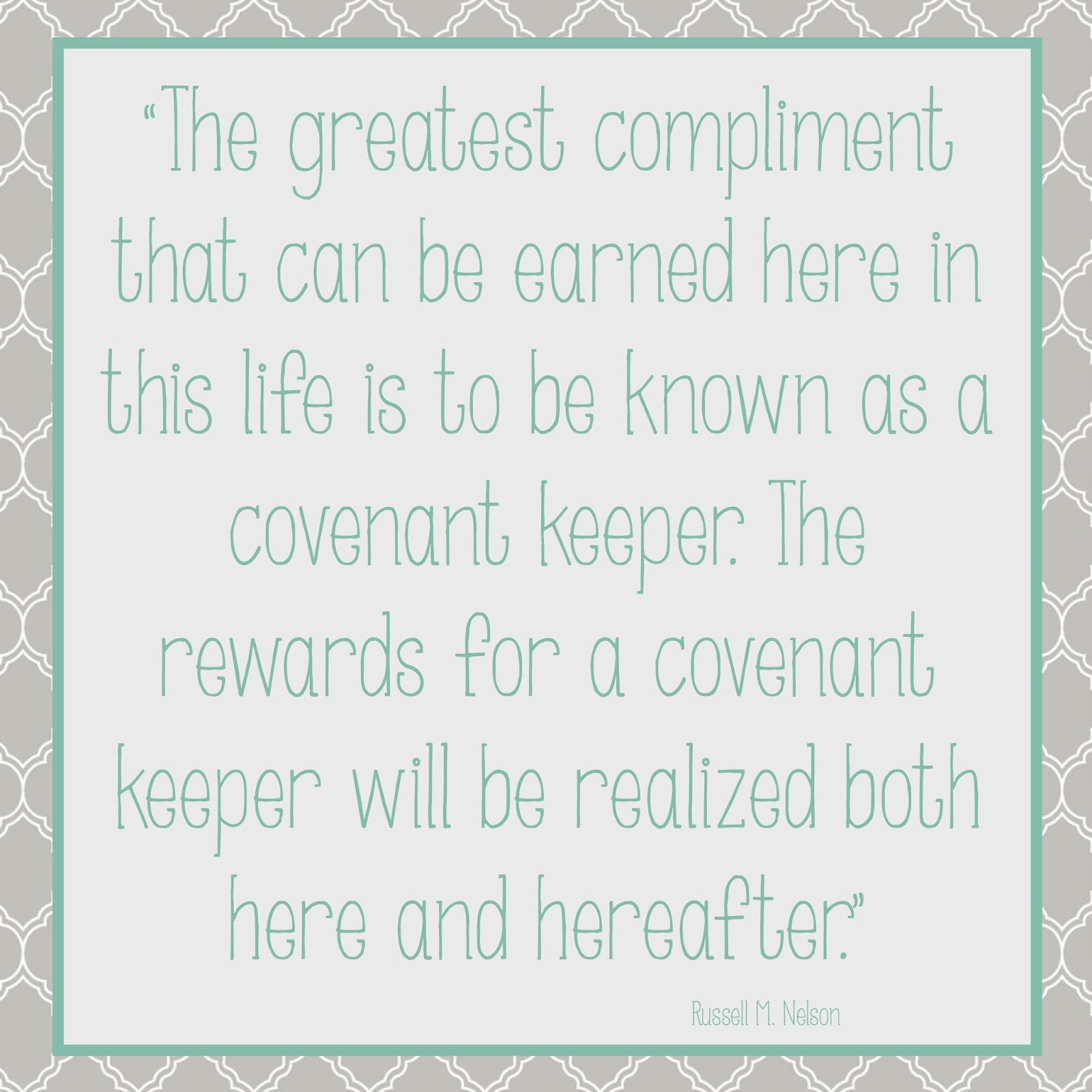 Covenanting is a huge feature of Mormon theology and group life. Beginning at age eight with baptism, and extending through the temple endowment and sealing rites, Latter-day Saints make a lot of covenants. Sundays build into the sacrament ritual the chance to “renew” the covenants one has made. For many Mormons, making these covenants are among the most sacred events of their lives, inspiring them to try to live up to the promises contained within each covenant. For others, especially those whose faith has shifted in the years following the time they made covenants, the burden of having covenanted to do something that they are no longer as certain about, or perhaps even now reject, can be crushing. Some feel regret that the “Mormon track” has members make covenants at very young ages, prior to the typical times when complexity enters one’s worldview. “If only I’d known what I know now, I would have chosen differently.” Others feel they were underprepared for the specifics of the covenants they made in the temple, and that when they reached that stage of the endowment they went ahead with them partly because of family and loved ones who were present and expecting that of them. Mormonism teaches that when things are done through proper priesthood authority, “what is bound on earth is bound in heaven.” How, then, should someone whose journey is taking them into great complexity regarding Mormonism relate to such weighty covenants?
Covenanting is a huge feature of Mormon theology and group life. Beginning at age eight with baptism, and extending through the temple endowment and sealing rites, Latter-day Saints make a lot of covenants. Sundays build into the sacrament ritual the chance to “renew” the covenants one has made. For many Mormons, making these covenants are among the most sacred events of their lives, inspiring them to try to live up to the promises contained within each covenant. For others, especially those whose faith has shifted in the years following the time they made covenants, the burden of having covenanted to do something that they are no longer as certain about, or perhaps even now reject, can be crushing. Some feel regret that the “Mormon track” has members make covenants at very young ages, prior to the typical times when complexity enters one’s worldview. “If only I’d known what I know now, I would have chosen differently.” Others feel they were underprepared for the specifics of the covenants they made in the temple, and that when they reached that stage of the endowment they went ahead with them partly because of family and loved ones who were present and expecting that of them. Mormonism teaches that when things are done through proper priesthood authority, “what is bound on earth is bound in heaven.” How, then, should someone whose journey is taking them into great complexity regarding Mormonism relate to such weighty covenants?
In this episode, Charles Randall Paul, Jennifer Finlayson-Fife, and Joseph Stanford, join Mormon Matters host Dan Wotherspoon for a wonderful and intense query into covenanting within Mormonism and whether or not it, or God, has an expectation of personal growth and change that would naturally affect our views and understandings of covenants we have previously made, about what exactly are we “bound” to with regard to our covenants, and several other aspects of this topic. The panel shares their own experiences and thoughts about their covenanting pasts and relationships with them now, and seeks to celebrate best thinking and ideas about us as covenanters that doesn’t depend upon static relationships with God and “etched in stone at the time one covenanted” understandings of this important element of the Mormon tradition.


Comments 6
Dan,
I want to thank you and your guests for the excellent insight and tone with respect to this podcast. It truly gave me a greater appreciation on covenants and the true relational intent that is provided within. It is this kind of format and respectful tone that is so much needed vs. the other podcast sites that appear to be perpetually critical and less than faith promoting. Keep up the good work and can’t wait for more to follow!!!!
I greatly appreciate the fact that this podcast is not anti LDS but helps us view covenants in a different way. I’ve been in the church for 65 years and I’ve never heard these things discussed. I know that I certainly see my covenants with new understanding now than I did when I got married. I’m going to bring this fact to the attention of others in Relief Society of Sunday School because I think we need to understand how they change as we do. My grandson is going on a mission and will be going to the temple soon. I want his parents to talk to him about the temple covenants before so it is not surprising.
Thank you.
One other thing. Sometimes I hear a podcast that disturbs my testimony and I feel conflicted. Perhaps you could do a podcast on how we deal with the negative influences that challenge our positions. One such concern I have seen a great deal of is the way women are treated in the church. My grand daughter recently asked, “Daddy, why aren’t there any women sitting in front?” Many have a difficult time with the ramifications for women.
Author
Hi JoAnn,
I think that you’ll find Mormon Matters carries a constructive, positive tone. We certainly deal with difficult issues, but in nearly every case, I bring on people who are either actively engaged in Mormonism or at least are willing to grant good will towards it. (There are a couple of surprise exceptions to this in its history, but the guests’ attitudes there caught me by surprise. Still, I made the effort to turn the conversations toward the big picture and greater hopefulness.)
I encourage you to click on the “Episode List” tab along the top banner. There you’ll find topics and presenters that I think will interest you. We’ve certainly done many shows about women’s voices and participation, etc. And I think a lot of the episodes deal at least indirectly with how to approach negative influences. Ultimately, on that question, my sense is that a negative influence changes ones position, that position needed to be changed (or understood more fully) anyway. Of course, that doesn’t mean that an assault on that position should ever come from someone with a negative or faith-destroying agenda (rather than a truth-telling, hope-to-assist or help deepen understanding one). When the negative agenda assaults happen, it’s unfortunate. But we must also remember that “faith” is not primarily about “beliefs” nor should it be based on specific truth claims. We are to have faith in God, and that faith must be in relationship that we’ve developed over time and experiences in Spirit. Can/do we “trust” God, and are we ourselves “trustworthy” in our interactions with God? That’s the essence of faith, which to me takes away so much of the power of “negative influences.”
All best! Hope you’ll enjoy more Mormon Matters episodes!
Great conversation. A few thoughts:
1. One framing I use is that covenants are not about what to think, they are about how to live. They speak much more towards orthopraxy than they do orthodoxy. In this way they are robust against faith crisis that are about loss of trust in the truth claims in orthodoxy.
2. In Mormonism, we have the doctrine that what ratifies and seals our covenant is not merely priesthood but rather “the Holy Spirit of Promise”. This gives great room for us to find the meaning, interpretation, and application of our covenants as guided by the Holy Spirit. This makes covenants personal and powerful in the changes of a faith journey.
3. On the wording in the temple about covenanting to give all that we have to the church it’s so important not to prematurely end that sentence. We don’t promise to give everything to the church without constraint; we promise to give everything to the church “for the building up of the Kingdom of God on the earth and for the establishment of Zion”. That covenant is given constraints, it is not a blank check for obsequious obedience. The question isn’t, “Have I given enough to the church?” the question is, “Is this effort in the church ‘building up the Kingdom of God’ or ‘establishing Zion’?” If so, then I want to dedicate my time, talents, and blessings I’ve received to that effort. And if the spirit does not witness to me that a particular effort of the church is worth of those goals then the covenant itself gives me place to withhold those things. That “Holy Spirit of promise” guides me in how I live that covenant.
4. On relativism vs absolutism: In Mormonism we do have a degree of relativism baked into our scriptures and theology. Nephi teaches that we are to liken the scriptures unto ourselves. That’s a fairly post-modern view. The Book of Mormon also teaches that God speaks to all nations and that they write what they hear and understand. And in the Doctrine and Covenants (sec 1) it mentions that the revelations and commandments are given to us in our own weakness and according to our understanding. One way to look at it is to see Mormonism as a multi-dimentional shape. That God’s kingdom and truth has contours and edges or boundaries, but that there is a space within that shape which we can explore with the spirit guiding us. So while there are infinite ways each one of us can understand, interpret, and apply covenants that acknowledge and give space for the intersubjectivity of life, there are also limits to that diversity. Same for covenants. How I live my covenants may look differently than you, but we can give space for one another with patience, faith, and love.
Author
Thanks, Caleb! I’d anticipated us talking about #2 and #3 in your list, especially about the Holy Spirit of Promise (wasn’t sure on the other, if we’d get into specifics of the temple covenants), but the conversation veered off. In other words, I completely agree with you on both of those! 🙂 And also the other two. Thanks for sharing here!
Best stuff I have heard on Mormon Matters. Thanks. I am going to listen again.